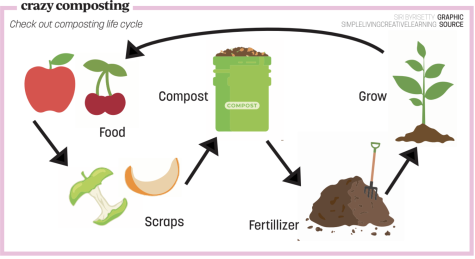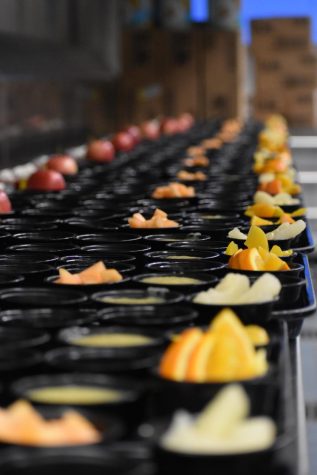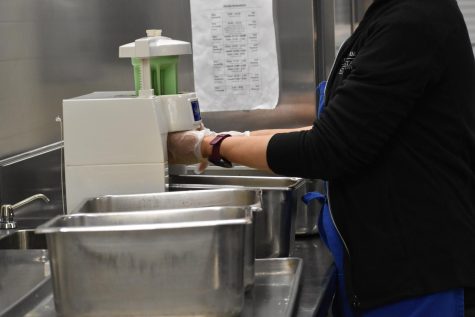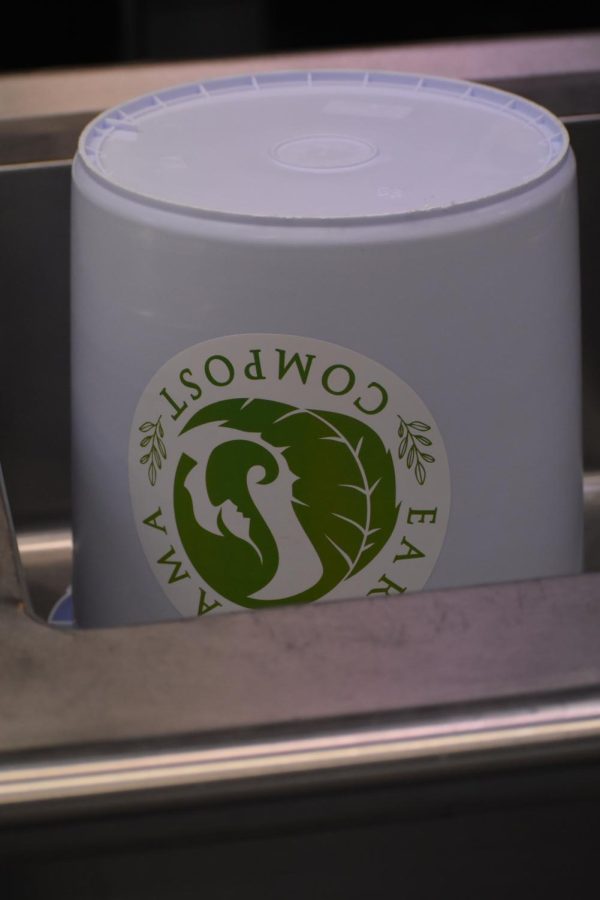Junior Ashlyn Walker said she believes in composting and its benefits at home and at school. Through composting the amount of garbage sent to the landfill is reduced, she said, the organic matter is reused rather than dumped and it is recycled into a useful soil amendment.
“Composting is really important for not just the school, but at homes and businesses as well,” she said. “Food waste makes up such a large percentage of waste around the country, and composting is a great way to use that food waste and repurpose it into multi-use soil.”
Senior Julien Doty said he agreed with Walker about the many benefits that come with composting and its impact on other people.
“Well for one, it will significantly reduce our carbon footprint so it’s a very great way to introduce sustainable actions and our student body to become familiar with sustainability,” he said.
Recently, the Carmel Education Foundation (CEF) implemented a student-led grant this semester, and a $15,000 grant to compost in all schools will be implemented the following year through the Indiana Department of Environmental Management.
“The grant was graciously given to us by CEF, and it supplies the funds for us to partner with a third-party composting company that collects almost 500 pounds of food waste every week,” Walker said. “The CCS district also applied for a grant through the Indiana Department of Environmental Management to expand composting to all schools in the district, and they won that grant. This will allow us to expand composting to the middle and elementary schools in the CCS district, and educate younger students about the importance of composting.”
Doty said the Green Action Club (GAC) applied for and won the grant, and members have already started to use the funds to implement changes throughout the cafeterias.

“The current composting program is being funded by a grant from CEF, and the Green Action Club led the whole process of applying for that grant,” he said. “We wrote some responses, some questions and created a short video explaining the benefits of composting. We applied for it and won the grant from CEF to fund behind-the-counter cafeteria composting. Every week they are collecting 64 gallons of food scraps.”
Doty said this grant would bring a lot of awareness regarding composting, especially the many benefits that come with it.
“One of our key parts of the composting program is to initiate or incorporate it into the curriculum,” he said. “Some health teachers are sharing presentations at GAC mainly detailing some of the benefits of composting, how it’s working at the school and how students can compost at home at their household. It’s just a very great way to get people informed about composting and how it can be a practice to reduce carbon emissions and achieve sustainability.”

Carey Anderson, GAC sponsor and computer science teacher, said there are two main goals for these composting grants.
“Our CHS composting initiative has two parts. One, implement it in the main cafeteria, on the back end, food preparation side,” she said. “Two, educate staff and students about the benefits of composting. This saves food waste from going to the normal trash and landfills. The compost can be used as soil for planting gardens or flowers.”
Anderson said composting, especially at a large school such as this one, will have many significant benefits.
“We have such a large student body with over 1,300 student lunches being served daily. Just think about all that food waste we had before composting in our trash bins daily and weekly,” she said. “We are making a difference and other schools around Indiana can see this and hopefully follow in our footsteps.”
Doty said there are many benefits that come with these grants, both long and short-term.
“In the short-term, it’s a great way to minimize our waste and make sure we’re conscientious about how we are disposing of unconsumed materials,” he said. “In the long term, this program, even by the next school year, will expand to all 16 schools in the CCS district so every school will be having a fully operating cafeteria composting program.”
Doty also said there are many individual things students can do to compost at school.
“We plan to, by next school year, create some information flyers, detailing what can be composted,” he said. “For now that would be veggie scraps, fruit scraps and bread possibly. If it’s grown from the ground, it’s compost-bound.”
Walker said she expects a lot of positive benefits from these grants and believes in the longevity of this project.

“I see a lot of benefits coming from the implementation of composting at the school,” she said. “Not only will this new program help to make CHS a more sustainable school by reducing our wasted food, but with introducing composting in front of the counter (by students), we plan on educating students on the process of composting, why it’s important, and how they can make their own compost at home.”































![What happened to theater etiquette? [opinion]](https://hilite.org/wp-content/uploads/2025/04/Entertainment-Perspective-Cover-1200x471.jpg)














































![Review: “The Immortal Soul Salvage Yard:” A criminally underrated poetry collection [MUSE]](https://hilite.org/wp-content/uploads/2025/03/71cju6TvqmL._AC_UF10001000_QL80_.jpg)
![Review: "Dog Man" is Unapologetically Chaotic [MUSE]](https://hilite.org/wp-content/uploads/2025/03/dogman-1200x700.jpg)
![Review: "Ne Zha 2": The WeChat family reunion I didn’t know I needed [MUSE]](https://hilite.org/wp-content/uploads/2025/03/unnamed-4.png)
![Review in Print: Maripaz Villar brings a delightfully unique style to the world of WEBTOON [MUSE]](https://hilite.org/wp-content/uploads/2023/12/maripazcover-1200x960.jpg)
![Review: “The Sword of Kaigen” is a masterpiece [MUSE]](https://hilite.org/wp-content/uploads/2023/11/Screenshot-2023-11-26-201051.png)
![Review: Gateron Oil Kings, great linear switches, okay price [MUSE]](https://hilite.org/wp-content/uploads/2023/11/Screenshot-2023-11-26-200553.png)
![Review: “A Haunting in Venice” is a significant improvement from other Agatha Christie adaptations [MUSE]](https://hilite.org/wp-content/uploads/2023/11/e7ee2938a6d422669771bce6d8088521.jpg)
![Review: A Thanksgiving story from elementary school, still just as interesting [MUSE]](https://hilite.org/wp-content/uploads/2023/11/Screenshot-2023-11-26-195514-987x1200.png)
![Review: "When I Fly Towards You", cute, uplifting youth drama [MUSE]](https://hilite.org/wp-content/uploads/2023/09/When-I-Fly-Towards-You-Chinese-drama.png)
![Postcards from Muse: Hawaii Travel Diary [MUSE]](https://hilite.org/wp-content/uploads/2023/09/My-project-1-1200x1200.jpg)
![Review: "Ladybug & Cat Noir: The Movie," departure from original show [MUSE]](https://hilite.org/wp-content/uploads/2023/09/Ladybug__Cat_Noir_-_The_Movie_poster.jpg)
![Review in Print: "Hidden Love" is the cute, uplifting drama everyone needs [MUSE]](https://hilite.org/wp-content/uploads/2023/09/hiddenlovecover-e1693597208225-1030x1200.png)
![Review in Print: "Heartstopper" is the heartwarming queer romance we all need [MUSE]](https://hilite.org/wp-content/uploads/2023/08/museheartstoppercover-1200x654.png)



